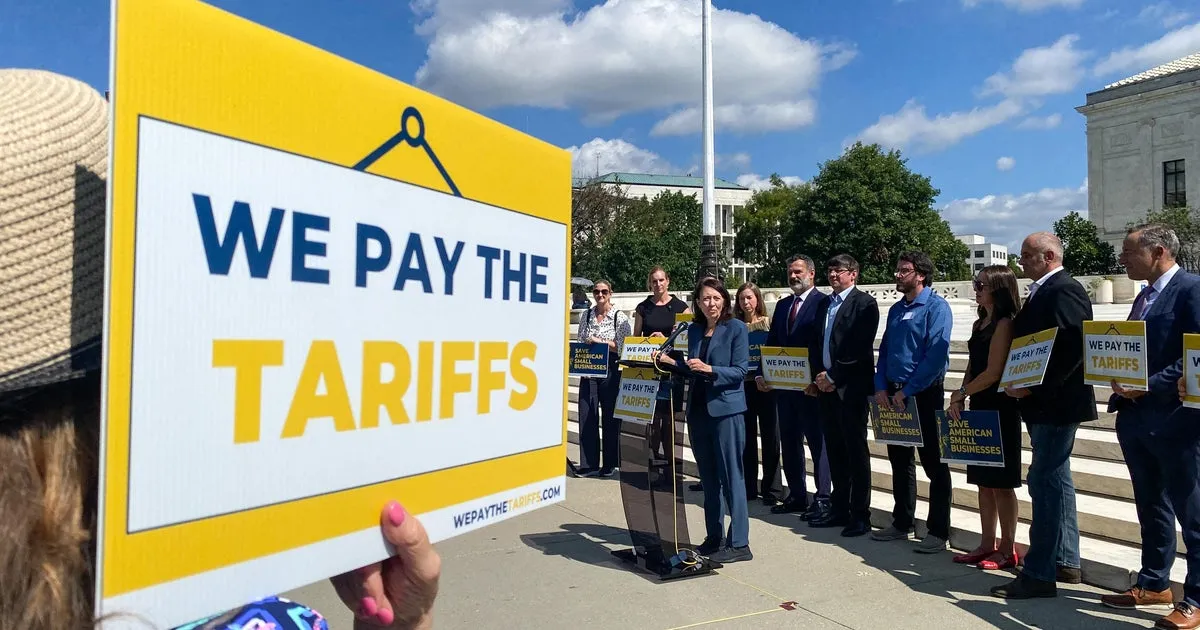
In recent months, small business owners like Lindsay Hagerman have faced significant uncertainty due to fluctuating tariffs on imported goods. As the co-owner of RainCaper, a Pennsylvania-based company specializing in art-inspired travel accessories and gifts, Hagerman has been particularly affected by the unpredictable tariff rates on goods imported from China. These tariffs have swung from 10% to as high as 145%, leaving many business owners questioning their pricing strategy and future operations.
Hagerman expressed her concerns to CBS News, stating, "You're struggling with how do we price — do we change prices now? Wait? I don't want to gouge people. That's not how you do good business." Despite her commitment to ethical business practices, Hagerman faces the challenge of covering expenses while remaining competitive in the market. Founded nearly a decade ago with her mother, RainCaper sells a variety of products, including rain capes, umbrellas, scarves, and travel accessories to boutiques and consumers, primarily relying on imports from China.
As a result of these tariffs, RainCaper has had to make tough decisions, including laying off two of its seven employees and trimming overall expenses. Hagerman considered exploring manufacturing options outside of China but ultimately decided against it due to the substantial investment required and the logistical challenges of traveling to countries like Bangladesh and Cambodia, especially as a military spouse with a spouse stationed out of state.
The situation is further complicated by legal challenges against President Trump's use of tariffs. The Supreme Court is set to evaluate whether the president has the authority to impose tariffs under the International Emergency Economic Powers Act (IEEPA). Lower courts have ruled that such sweeping tariffs may be illegal, and a decision from the Supreme Court could significantly affect the future of tariff policy in the United States.
Since the initial announcement of tariffs, small businesses across the nation have been forced to navigate the complexities of rapidly changing tariff rates. Many have been compelled to divert resources to assess how these tariffs impact their bottom line and pricing strategies. According to a recent analysis from the Tax Foundation, these duties could impose a staggering $1.7 trillion in new taxes on Americans by 2035, while also stunting economic growth.
Julie Robbins, CEO of EarthQuaker Devices, has seen her family-owned company incur nearly $40,000 in tariffs, significantly affecting operations. EarthQuaker, which manufactures guitar pedals in Akron, Ohio, has had to adjust its sourcing strategies and pricing due to the tariffs. Robbins highlighted the challenges of finding domestic suppliers for the specialized components needed for their products, emphasizing that breaking longstanding relationships with overseas manufacturers could jeopardize their supply chain.
Similarly, Price Johnson, chief operating officer of Cephalofair Games, reported that his company had paid over $144,000 in tariffs recently. The uncertainty surrounding tariffs has forced Cephalofair to make difficult decisions, including increasing product prices and furloughing employees. Johnson noted that the unpredictability has left importers like himself with little ability to plan ahead.
The ongoing legal battles over tariffs not only influence small businesses like RainCaper and EarthQuaker Devices but also have broader implications for presidential power and economic policy. If the Supreme Court upholds the tariffs, future administrations might lean more heavily on the IEEPA to impose tariffs without congressional oversight. As the situation evolves, small business owners will continue to monitor developments closely, hoping for a resolution that stabilizes their operating environment and allows them to thrive in a competitive market.